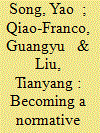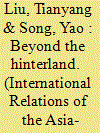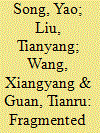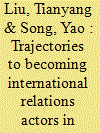|
|
|
Sort Order |
|
|
|
Items / Page
|
|
|
|
|
|
|
| Srl | Item |
| 1 |
ID:
185563


|
|
|
|
|
| Summary/Abstract |
Maintaining robust diplomatic relationships with neighbouring countries in the Mekong region has become strategically critical to China. Since President Xi Jinping took office, China has been renovating normative power in the Mekong region, endeavouring to socialize the Mekong countries into accepting normative Chinese concepts, such as ‘community of shared destiny’, by mobilizing and reconfiguring their material and normative recourses. This article argues that China's normative power stems from two primary mechanisms: 1) an organized, top-down diffusion driven by political elites, involving inter-governmental dialogues, socialization via bilateral and multilateral cooperation mechanisms, and negotiations with countries co-opted into China-led connectivity and infrastructure initiatives; 2) a bottom-up diffusion of ideas from practices (i.e. exchange of goods, trade, aid) and the physical presence of China in the Mekong region, exemplified by the massive scale of infrastructure widely constructed in the region. Taken together, China's expanded normative engagement in the Mekong subregion is comprised of multiple, oscillating modes of normative production that have been ‘synchronized’ across riparian countries with varied geoeconomic and geopolitical circumstances. Our findings suggest that while normative Chinese discourses have been accepted by the ruling classes of certain Mekong countries, China's attempts to build normative power have been largely shunned by the civil societies in the region.
|
|
|
|
|
|
|
|
|
|
|
|
|
|
|
|
| 2 |
ID:
186177


|
|
|
|
|
| Summary/Abstract |
The scholarly literature on paradiplomacy has tended to focus overly on subnational governments in federal systems rather than those in unitary and centralized countries. However, it is important to note that some subnational governments in these countries have been increasingly proactive in international relations (IR). This study explores the paradiplomatic activities of Yunnan, a province in the south of China which, since the early 1990s, has actively engaged in cross-border cooperation. Combining the concept of paradiplomacy with the theory of actorness, this study first argues that Yunnan has been incentivized to conduct paradiplomacy through the decision of Beijing to open China’s borders; the inefficiency of the central government in managing border-related issues; and the interprovincial competition over economic and diplomatic clouts in the Mekong subregion. Second, this study argues that Yunnan’s new external affairs powers have been consolidated by a host of new opportunities stemming from the external environment. Third, it argues that Yunnan’s new external affairs powers have enabled it to leverage two broad instruments (infrastructure development and economic statecraft) to make neighboring countries more dependent on cooperation with it. And finally, it is argued that Yunnan’s role as an IR player has been acknowledged both by neighboring countries and by Beijing.
|
|
|
|
|
|
|
|
|
|
|
|
|
|
|
|
| 3 |
ID:
175474


|
|
|
|
|
| Summary/Abstract |
While most scholars agree that China’s central authorities are no longer the sole actors controlling socio-political life in the country, few have paid adequate attention to the proactive role of China’s grassroots actors, especially during critical public crises. During the 2020 Covid-19 outbreak, Chinese society was fragmented in its response. Rural authorities imposed capricious and uneven restrictions, and civil disobedience among urban residents assumed myriad guises. The degree to which state directives on virus control were implemented within rural China depended on two factors: individual villages’ social structures, and how effectively political pressures were channeled from the top down. Furthermore, quarantined residents in urban areas should not be understood as passive victims, but rather as active subjects, whose diverse manifestations of civil disobedience during the crisis posed a challenge to the effectiveness of official restriction policies.
|
|
|
|
|
|
|
|
|
|
|
|
|
|
|
|
| 4 |
ID:
180651


|
|
|
|
|
| Summary/Abstract |
While Chinese paradiplomacy has received growing academic attention, little is known about how different provinces within China act as international relations players of their own accord. This paper adopts a comparative perspective to address this gap. It develops three dimensions of international actorness (authority, motivation, and instruments) to examine whether and how Chinese provinces have satisfied the criteria for being international relations actors through their engagements in the Belt and Road Initiative (BRI). Using Guangdong and Yunnan as examples, this paper casts light on the plural occasions in which the de-centralized state control of foreign affairs and the growing external activism of provincial entities have worked in tandem to widen the footprints of said provincial entities in the countries of the BRI. Drawing on Guangdong-Hong Kong competition and Yunnan-Guangxi rivalry, this paper unpacks the motivations of provincial engagements in the BRI by exploring the utility of imitation tactics used to gain comparative advantages vis-à-vis their domestic counterparts. While comparing the Guandong and Yunnan’s leveraging of strategic instruments, this paper also reveals Guangdong’s strong globalist, mercantile mentality in its external interactions, in contrast with the more regionalist and stability-oriented approach of Yunnan.
|
|
|
|
|
|
|
|
|
|
|
|
|
|
|
|
|
|
|
|
|